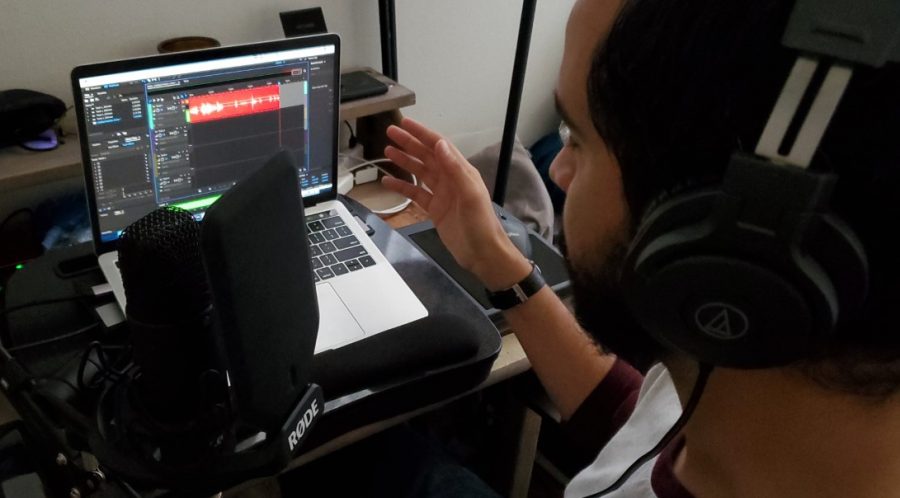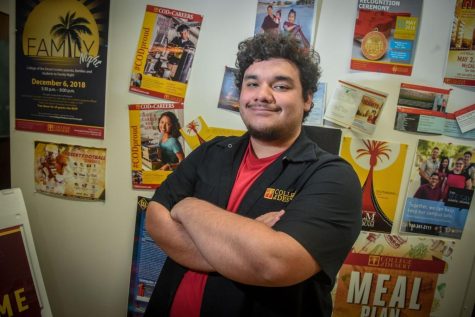Faculty share their experiences moving online
Photo courtesy of Alexandro Zatarain. KCOD lab tech and radio production adjunct instructor Alexandro Zatarain teaching and creating content for KCOD at home.
May 11, 2020
Several weeks into online classes and nearing the end of the semester, some of College of the Desert’s professors reflect on their move to online and how their classes were affected by the sudden transition.
With the fear of Coronavirus shutting down in-person classes across America, educational institutions were faced with the herculean task of migrating their classes to an online format in the middle of the semester.
COD instructors’ frequent use of Canvas for assigning and receiving coursework prior to quarantine conditions and the availability of Zoom for online lectures had most of them better-positioned for the shift.
However, the process of quickly adapting classes that had previously relied on in-person meetings and campus resources provided instructors with many challenges they would have to overcome if they were to get through the rest of the semester.
While all professors had anticipated the move and started to prepare, some were better prepared or better situated than others to quickly make the change, like Dr. Michael Karp who teaches multiple history courses at COD.
“I was able to transition my classes online immediately, in large part because I already used Canvas in my classes and had the fortune to have taken COD’s faculty training to become certified in distance education,” Karp said.
History classes like his might be easier to migrate online due to the nature of their instruction and Dr. Karp explained that students have been able to transition despite some initial issues and classes are proceeding smoothly. However, there are many classes that needed to be completely overhauled for online instruction, taking losses in the process.
Theatre arts professor Janet Miller talked about how she overcame the unique challenges she faced, “All of the classes I teach have an element of collaboration, so I needed to shift the focus. The projects are more singular in nature at this juncture. Tap dance has morphed into history of tap dance, which is also helpful to know when studying any form of dance.”
Not just tap dance, but other theatre arts classes have had to shift in how and what they teach students while they are unable to meet. As previously reported, COD’s production of The Complete Works of William Shakespeare (Abridged) needed to be cut short, and no future plays can be performed unless the situation improves.
Professors from the science department have also had to make compromises in order to teach their classes, especially those teaching labs. Organic chemistry professor Robert Guinn said that while his classes were still up and running, they still were not up to par with in-person classes.
“There’s this false belief that online classes are easier or less work. The opposite is true, for everyone involved, Especially if the subject matter doesn’t lend itself to multiple-guess exams,” Guinn said.
Combating cheating when students must take multiple-choice exams at home is hard enough, but adapting lab exams that might make use of models and lab instruments is an even greater challenge.
“Transitioning lab was a nightmare. There’s no substitute for doing an experiment in person, but I tried to use it as an opportunity to be creative, collaborate and think of lab skills students could learn from home,” said Guinn.
Radio production students and faculty were faced with a daunting task of producing content without the use of the KCOD radio station, where they had access to software, hardware and recording areas.
“We were definitely presented with a situation that forced us to think and act swiftly,” said lab tech and adjunct instructor Alexandro Zatarain, “We had to ensure students weren’t put in a position where they can’t perform the duties expected out of them for our courses.”
To aid in their production from home, KCOD helped provide its DJs with recording equipment and tutorials in other recording software and despite these complications, KCOD students have continued to produce quality content.
While all of the teachers questioned wanted to revert back to in-person classes, more important to them was the safety of their students.
Teachers have gone above and beyond to provide the best tutelage they can, given the conditions. Deadlines have been extended, opportunities provided and availability for help kept consistent or even increased; all done to help their students make it through.
The transition has been hard, but COD and its students have persevered together.
“I am thankful for all the hard work the COD community has done to get students to access to these needed resources during these trying times. And I am incredibly proud of all our students who have continued to work hard, be patient and resilient as we all work together to meet these challenges,” said Dr. Karp.


